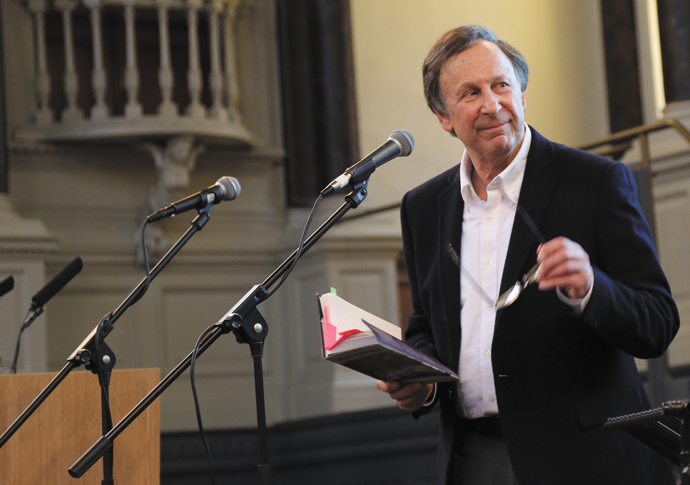Muse update
Once forever preoccupied with other others’ books, publisher Jeremy Robson has his poetry mojo back
Thursday, 25th May 2023 — By Dan Carrier

Jeremy Robson
UNDERSTANDING the world through art provides solace and tranquility – and for publisher and poet Jeremy Robson, the enforced change of pace during the pandemic gave him ample time to consider his lot, and then give voice to his thoughts through his poetic sensibility.
The Hampstead-based writer had a previous anthology of his work, The Heartless Traffic, published the month before the nation went into a Covid lockdown for the first time.
His new collection of 60 pieces, called Chagall’s Moon, stem from the past three years, he says.
“Inevitably, they reflect the changed world in which we find ourselves, the pandemic hovering over all our lives, Brexit, the war in Ukraine, a digitally dominated world, mobiles and Twitter the new Babel,” he explains.
“Nevertheless, it is a very personal collection, everything seen through my own eyes, and distilled into landscapes or settings with which I hope readers will easily identify and respond to – whether it is Camden High Street, the treacherous currents of the English Channel, or the music of Beethoven and Billie Holiday, and indeed the lovers hovering innocently in a clear blue Chagallian sky while an invisible killer – Covid – stalks the streets below.”
Before Jeremy set up the publishing house Robson Press, he was heavily involved in the poetry scene, from putting on jazz and poetry events to writing his own pieces and reviewing others.
“I was friendly with many poets, went on a reading tour with Ted Hughes and Dannie Abse and others, and was at the centre of the poetry world,” he says.
“But once I had my own publishing company everything changed and I suffered what I jokingly refer to as the longest writing block in literary history as far as poetry was concerned – some 40 years.
“I suppose I was too deeply immersed in the work of others, living their books with them, editing away, promoting them, coping with the constant financial strains. But I only very rarely published poetry, Vernon Scannell’s being a notable exception, and I found it hard to talk about it, and impossible to write.”
As he began to ease himself away from the daily work of a publisher around a decade ago, the poetry spring inside began to well up once more. “The poems suddenly began to flow again,” he says.
Working with Smokestack Books, he has now produced four anthologies and has hit the road once more, as he did in the 1950s and 1960s, to read his work to audiences.
“I have been fortunate to read at various events, often alongside brilliant jazz musicians as I did all those years ago, at the old Hampstead Town Hall and hundreds of other places,” he adds.
Poetry comes from expected places – the combination of his imagination and exterior world – but at unexpected times.
“It is often the result of hard graft, the words turning in a direction I didn’t expect, like notes in a jazz solo, creating a certain magic,” he reveals.
“A phrase circling in my head, coming from I know not where, can spark a poem, sometimes intruding on sleep, and I’ll leap up in the darkness of night to write down those lines, and those that flow from them, compulsively.
“If I don’t, like dreams, they’ll be lost by the morning, gone for ever. And poems are too hard to come by to let them go.
“Sometimes something quite unexpected will spark off a poem, like the flower stall at the beginning of Parkway in Camden, or a moon over the neighbouring rooftops, as in the title poem of my new book, a light in someone’s front room where a lady is playing the piano, and love and friendship and loss are constant companions, as are dreams and nightmares.”
“I guess I’m a romantic. There is, I’m afraid, no magic formula. And talking of friendship, my dear solely missed friend, the marvellous poet Dannie Abse, often quoted Louis Pasteur who said” ‘Chance favours the prepared mind’. That sums it up perfectly.”
The other art forms he loves impact on his writing.
“I have a strong interest in music, classical and jazz, and in the arts generally, so like the paintings of say Picasso or indeed Chagall, this is occasionally reflected in poems, but not in an abstruse or academic way,” he adds.
“And while I believe strongly that poems are written for the page, I often read my poems in public.
“Since poets do write for their voices this can be an effective way of enticing readers to turn to the written page – an extension but not a substitution.”
But Jeremy does not solely focus on aesthetic pleasures. The grim world out there cannot help but find its way on to the page.
“Who can ignore the daily images on our screens of bombs blasting people’s lives to smithereens, or not be aware of recent history – for me, as a Jew, the images of the Holocaust still hovering in dreams and nightmares? These are roots and the trauma of recent history never shed.”
And above all, writing poetry is offering the reader a window into the writer’s soul – a key facet of every successful poet, Jeremy believes.
“In poetry, personality is important,” he says. “All the best poets have this. Eliot, Dylan Thomas, Yeats, Ted Hughes, Philip Larkin, even John Betjeman, Wilfred Owen, all have this, their own stamp, their own distinct voice.”
• Chagall’s Moon. By Jeremy Robson. Smokestack Books, £7.99